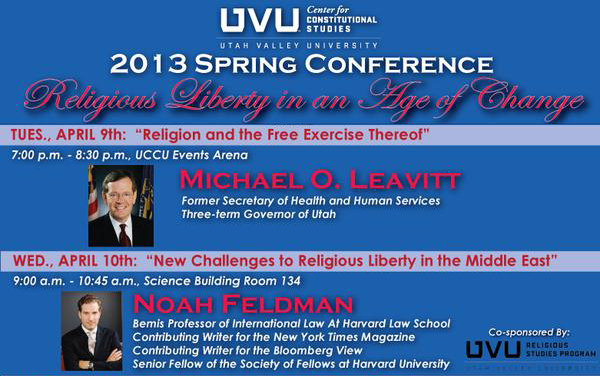This week, scholars from across the country gathered at Utah Valley University in Orem, Utah, for a two-day conference entitled “Religious Liberty in an Age of Change.” They offered opinions and experiences in debate that exemplified serious and respectful conversation on the topic. Though each scholar had a distinct view, all expressed belief that religious liberty plays a vital role in promoting a just society and securing the rights of individual conscience.

The keynote address on Tuesday was given by former Utah Governor Michael Leavitt, who pitched a spirited defense of the role of faith in the public square. “Faith sustains our democracy, galvanizes our citizenry and makes for a more peaceful and compassionate country,” he said. That faith could not flourish without a constitutional religious liberty that “provided our democracy with more than an intellectual underpinning; it gave it moral force,” said Leavitt. He stressed that a society as diverse as ours can thrive with its differences. “It is my firm belief that the free expression of religion and other interests can — and, indeed, must — coexist.”
But religious liberty is not only an American concern, as Harvard law professor Noah Feldman recognized Wednesday in his keynote address, “New Challenges to Religious Liberty in the Middle East.” He argued that religious liberty is shaped, for better or worse, by transformative events in a country or region. He noted that while some religious groups experience an increase of religious liberty after such events, others may become more vulnerable to oppression.
The conference’s three panels explored a wide range of topics covering history, politics, philosophy and current challenges. Feldman described “two leading schools of thought” on the relationship between religion and government in America. The first group is “legal secularists,” who are not necessarily anti-religious but believe that laws should not take account of religion in the public square. The second group is “values evangelicals,” who participate in secular life but believe that the purpose of government is to take account of religious values in the public square.
The problem, according to Feldman, is that both sides imagine they are in the minority and besieged by the other. He said this needless impasse stifles cooperation on important matters; he recommended that both sides “get beyond our background assumption that people who have a different perspective than us are somehow oppressing us.”
Dartmouth historian Randall Balmer said that though he believes in a strict separation of church and state, “religion does belong in the arena of public discourse.” However, he continued, “we also have to pay attention to the rules of engagement.” Mark Rienzi, law professor at Catholic University of America, argued that “a pluralistic, liberal, diverse society should allow differences” in religious convictions and expressions.
Professor Vincent Phillip Munoz of Notre Dame characterized the purpose of the conference: “It’s important to have public conversations on religious liberty; they help preserve our nation’s freedom.” They can also prompt action. In the closing words of Michael Leavitt: “Our religious beliefs can help us create a path toward the better future that awaits. [I ask] people of faith to live their beliefs, contribute to the day’s debates and bring their perspective to the public square.”